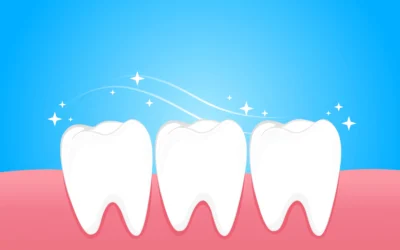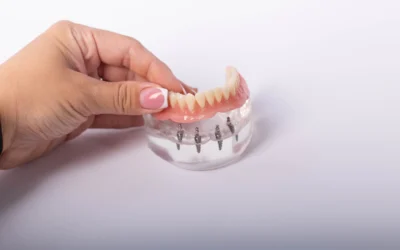Tooth pain can occur due to various reasons. Regardless of the cause, the pain can become severe enough to impact your quality of life if left untreated. As soon as you notice increased tooth sensitivity, visit your dentist for an examination. The examination will reveal whether any of the below reasons is causing your pain.
What Causes Tooth Pain?
The source of your tooth pain may be:
1. Tooth Pain from Cavities
Cavities occur as your enamel wears out, creating spaces for bacteria to invade and create holes in your teeth. Food particles can enter those holes, exacerbating tooth decay from within. As the problem worsens, it leads to inflammation inside the affected teeth, causing mild to severe pain. It may also make your dentition more sensitive to hot or cold foods or liquids.
Depending on the severity of the cavity, root canals or filling the cavity may be necessary to fix the problem. You may have sensitive teeth after getting fillings, but the pain lasts for only a few days, up to a few weeks.
2. Tooth Pain from Gum Disease
Poor oral hygiene can cause gum infections such as periodontitis or gingivitis. Other infection symptoms are:
- Bad breath
- Swollen gums
- Loose teeth
- Pus
See a dentist and verify whether you need a deep cleaning or surgery to cure the gum disease and alleviate your tooth pain.
3. Tooth Pain from a Cracked Tooth
Trauma to the mouth can cause a tooth fracture or crack. If you clench or grind your teeth, you may be causing microfractures in your teeth. You may also suffer a chipped tooth from accidentally biting down on a hard object. Depending on the degree of damage, you may experience symptoms such as pain when chewing or increased sensitivity to sweet and sour or hot and cold foods.
The proper treatment for a cracked tooth depends on the type of crack. According to the American Association of Endodontists (AAE), types of cracks that can occur on teeth are:
- Cracked tooth
- Craze lines (shallow cracks on the outer enamel)
- Split tooth
- Fractured cusp
- Vertical root fracture
4. Tooth Pain from an Abscessed Tooth
Abscesses typically occur when a cavity goes untreated, leading to a buildup of bacteria within the pulp chamber. As the chamber tries to drain itself, it creates pressure within the tooth, leading to ongoing pain that worsens when you touch or use the affected tooth.
As the abscess worsens, it can also cause severe swelling and pain on the affected part of your face. When you visit the dentist for a dental abscess, we will assess the best course of action, whether that is an endodontist visit for a root canal, or an extraction by a general dentist or oral surgeon.
5. Tooth Pain from Sensitive Teeth
Tooth sensitivity occurs when the tissue (dentin) beneath the enamel and cementum becomes exposed. Exposed dentin may occur due to gum recession, cracked teeth, cavities, worn fillings, and other issues.
6. Tooth Pain from Bruxism
Bruxism is a condition that causes a person to clench and grind their teeth, usually while asleep. The constant grinding wears down the enamel on teeth, leading to cracked teeth, sensitivity, and jaw and facial pain in extreme cases. Your dentist may recommend a dental night guard to get the condition under control or refer to a myofascial pain specialist.
7. Tooth Pain from Impacted Dentition
Impacted teeth occur when you don’t have enough room on your jaw for all your teeth to grow in. The most commonly impacted teeth are wisdom teeth because they are the last to grow. When the affected teeth can’t grow, they remain under the gum line, leading to mild to severe jaw pain. An oral and maxillofacial surgeon can perform surgery to remove the impacted tooth.
8. Tooth Pain from Root Sensitivity
An exposed tooth root becomes vulnerable to decay or trauma, which can trigger tooth nerve pain. If a tooth root is visible above the gum line, your dentist may apply fillings or dental bonding to resolve the problem. Applying a desensitizing toothpaste to the exposed root surface can also reduce pain and sensitivity. Periodontists also have various procedures that can cover exposed roots and restore your smile. See your dentist and discover the most appropriate treatment option.
9. Tooth Pain from a Loose Filling
Cavity fillings can last for several years, but they eventually fall out. Dangerous bacteria can get past a loose filling and attack the tooth’s pulp or blood vessels, leading to tooth pain. Before that happens, it’s best to have a loose filling replaced. Otherwise, you may have to contact an endodontist for a root canal procedure to fix the pulp tissue damage.
10. Tooth Pain from Sinus Problems
Sinus infections can increase tooth sensitivity. If the sinus infection is directly over your gums and the problem goes untreated, it can cause pain or discomfort in several teeth. See your dentist or doctor for a treatment plan.
Get Treatment for Your Tooth Pain Today
Do you have a hole in your tooth or other issues that are triggering tooth pain symptoms? If you are in the Greater Atlanta Area, contact My Emergency Dental for advice, diagnosis, or treatment. Our dentists handle various types of tooth injuries and diseases and know-how to ensure long-term relief.
For a minor problem, we can recommend over-the-counter medications. For more severe issues, such as tooth decay, we can provide pain medication and perform cavity treatment and filling. If the infection has reached the tooth’s nerve, our dentists can perform a root canal or extract the tooth.
After treatment, your dentist will also recommend preventive measures, such as regularly rinsing your mouth with warm salt water to get rid of food debris and bacteria.
Dial 470-523-8118 today to make an appointment with My Emergency Dental—the most accessible dental service provider in Atlanta, GA.



